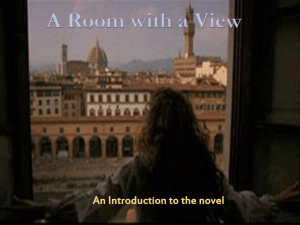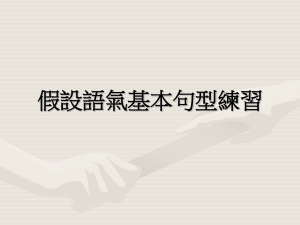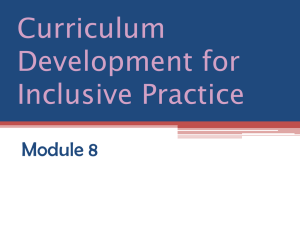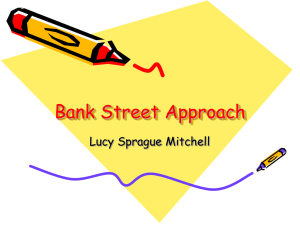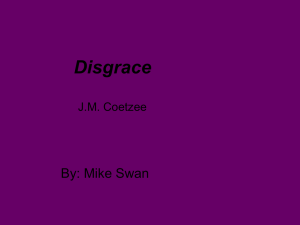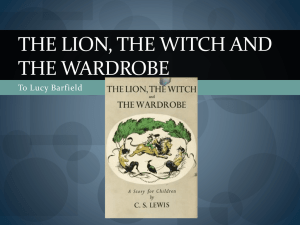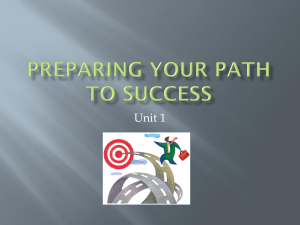A Room with a View
advertisement
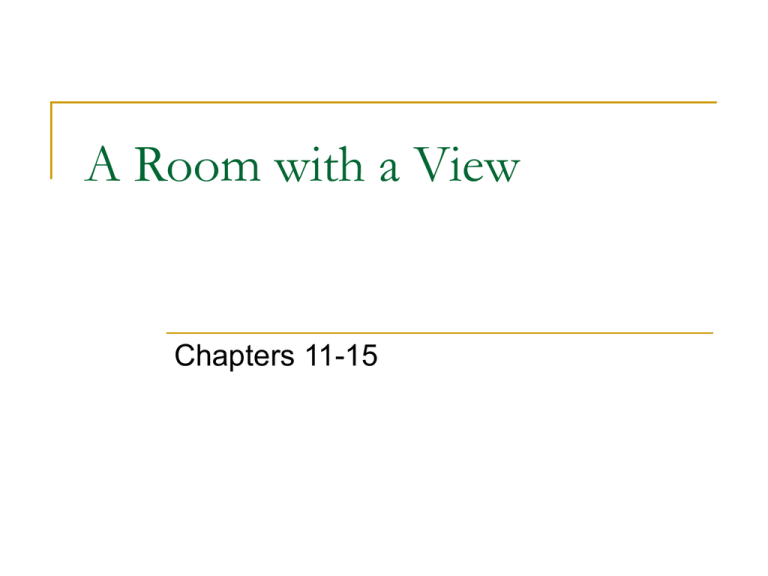
A Room with a View Chapters 11-15 11 – “In Mrs Vyse’s Well-Appointed Flat” 12 – “Twelfth Chapter” 13 – “How Miss Bartlett’s Boiler was so Tiresome” TITLES The titles contribute to the overall comic effect. They are jocular and detached as they specify scene, lay out the cast of characters, and identify thematic strands and symbolic motifs. The most extreme example is the title of Chapter 6, in which nearly all the characters thus far assembled are listed as in a dramatis personae of a play. The lengthy title concludes in a comic anticlimax: ‘[they: ] drive out to see a view; Italians drive them’; ‘well-appointed’ flat - well equipped or furnished; properly supplied => note the irony – what does the flat lack? ‘Miss Bartlett’s Boiler was so Tiresome” (plot) => what other significance do the words ‘tiresome’ or ‘boiler’ have? ‘Chapter 12’ => significance? the two chapters that function as the emotional and symbolic pivots of the novel, Chapters 4 and 12 – the murder in the piazza and the bathing scene at the Sacred Lake – have no titles. => draws attention to their importance - they cannot be reduced to clever phrases in a satiric scheme. CHPT 11 Introduction to London Society Note the differences between the the society described in Surrey, Summer Street and London. Pg113: ‘..dinner party consisting of the grandchildren of famous people..food was poor, but the talk had a witty weariness that impressed the girl. One was tired of everything, it seemed’ => society is not as tight-knit; emphasises the intellectual over the body; there is a general jaded or cynical air that is probably part of the pretentious intellectualism. Chpt 11 Lucy is negatively influenced ‘impressed’ – learns to ‘play the social game’ => Pg 113 “One launched into enthusiasms … collapse..laughter” Note choice of music – Schumann ‘its dejected phrases’ and ‘sadness of the incomplete..’ are more appropriate for the London crowd. Note: description of Mrs Vyse. Compare to Mrs Honeychurch Chpt 11 “ …her personality , like many other’s had been swamped by London..” implies loss of independence or individuality “…she was mechanical, and behaved as if he was not her son, but, so to speak, a filial crowd” => note lack of intimacy, connection and personal relationship. Detached and distant. Chpt 11 “He saw the needful fire had been kindled in Lucy. As she longed for attention, as a woman should, and looked up to him because he was a man.” (p110) – Chivalry Lucy’s and Cecil’s relationship => appears slightly more passionate, sparked by a new neediness on Lucy's part. [she felt safe in the London flat] Cecil's conclusion that Lucy has come to understand her place as a woman and learned to respect him as a man betrays his immaturity and lack of sensitivity. Cecil's lack of response to Lucy’s nightmare => distance in their relationship, and it further symbolizes Cecil's lack of sensitivity towards her. Chapter 11 – Letters We should reflect on the use of letters thus far… References to letters and letter-writing in ch 5 (with Charlotte sending and receiving letters) Letter-writing in chapter 8 (Mrs Honeychurch’s letter to Mrs Vyse) What is conveyed in the concept of a letter? Something written – therefore not disputable? Note the way the letter in Ch 8 reflects very little concrete information – reflects society’s conventions of refinement and tact. Letters are important form of social communication and interaction – even entertainment Consider it’s use as a narrative tool. Chapter 11 – Charlotte’s letter What is said? Charlotte is aware of George’s presence in Summer Street Charlotte is still in contact with Miss Lavish Lucy has suffered “a great misfortune” Charlotte feels there is a need to ‘warn’ Lucy What is not said? The kiss is not mentioned and is not even directly alluded to Charlotte has a poor regard for George (“He never suggested giving Eleanor a cup of tea”) Charlotte is still maintaining her “martyr” role (see ch 7, p 71) Chapter 11 – Lucy’s reply What is said? The kiss is almost addressed (“When Mr Emerson forgot himself on the mountain…”) She addresses practical considerations – such as rationalising reasons for the absence of tea She asserts a sense of control (“You must see it would be too absurd”) She asserts a new social strength (Cecil is aware of who the Emersons are) She makes more assertive statements (“do not put ‘Private’ outside your envelope again”) What is not said An admission of the kiss A direct statement of irritation at Charlotte’s attempt to spread or incite “gossip” Chapter 12 Note Seasonal motifs? – Autumn (in contrast to Spring in Part 1) “All that was gracious triumphed” (p115) => presaging maturity Theatrical presentation – Focus on Freddy and Beebe as chorus-like commentators “I suggest we should hinder them” – Beebe’s delight in social mischief echoes that of Chapter 6 Bees in classical and medieval times were often associated with industry and celibacy. They make honey so are associated with flattery. Beebe is honey mouthed but also has a sting when provoked Chpt 12 Note the quotation from RW Emerson’s contemporary – Thoreau (p116 – “Mistrust all enterprises that require new clothes”) – foreshadowing of the later events of the chapter? the trappings of civilization interfere with our appreciation for natural simplicity. Note the male-dominated world of the chapter. Emerson’s philosophy of equality (equity) with women is clearly indicated – (p117) “they shall be ‘comrades’. => ‘ideal relationship’ Freddy’s scepticism Note Beebe’s response as Emerson descends the stairs “We are to raise ladies to our level?” => what does it suggest of his attitude to women? Chpt 12 – bathing in ‘the Sacred lake’ the ‘Sacred lake’ is presented as a kind of pastoral Arcadia – an idealized rural setting where nature is kind and men and women can escape from the evils of society. Motor cars, commerce, duty, authority and class have no place here. The place lies beyond seasonal change and hopefully the intrusion of men. By putting their clothes away, the men have put away all worldly considerations. The sacred pool is a place of innocence and childhood. this is emphasised by the use of slangy or infantile language – ‘polly-wog’ ‘apooshoo’, ‘kouf’, Their actions are a demonstration of the kind of natural innocence that has been largely crushed by Society or the Church's repressive attitudes towards the human body. The writing is playful, celebratory and lyrical – grass is ‘sward’, weeds are ‘salad’ and the sun is shedding the ‘most glorious heat’. The description seeks to disrupt the mundane and everyday. There are touches of the burlesques becos you have 3 men rotating in a diminuative, weed-filled pond’ like nymphs’ Chpt 6 and Chpt 12 Like the Kiss in chpt 6, this incident implies a baptism into life through extensive use of water imagery. In chpt 6, George is described as ‘a swimmer’ who prepares – Here in chpt 12, he falls into an experience expressed in terms that are mostly associated with water. in chpt 6 – there was a release of passion Here there is much ‘male ragging and horse play, splashing and spreading of water. Effect on George is a release of inhibition and sexual energy. The effect is wholly beneficial – released from his gloom, ‘the forces of youth burst out leading to great display of high spirits. P121 ‘Michelangelesque on the flooded margin’ p120 is also applied to George – associating him with vitality and life while paradoxically idealising him as the perfect youth worthy to be worshipped by the other 2 with deference. George appears in a comfortable alliance with nature: "He regarded himself as dressed. Barefoot, barechested, radiant and personable against the shadowy woods" (123). However, the swimming incident is described (regretfully by narrator) as a moment of passing innocence; "On the morrow the pool had shrunk to its old size and lost its glory" (123). Still, the experience changed its participants in a lasting way : "It had been a call to the blood and to the relaxed will, a passing benediction whose influence did not pass, a holiness, a spell, a momentary chalice for youth" (129). Religiously charged words like "benediction" and "holiness" help convey the significance of this moment. High spirits shown here are exclusively male and seem strangely excessive. “Such a scene is magical and marginal and seems at odds with the general pattern of the text => it suggests an imaginative outbreak on Forster’s part => a need to celebrate masculine flirtation and camaraderie in a manner that declares its power and sexual appeal while simultaneously masking and concealing these things.” [critic Markley] It is on George’s body, Markley argues, that ‘the gaze is chiefly concentrated’. The bathing scene carries a sexual charge in its language, in the space it opens in the narrative for other longings, other resolutions. Here Forster writes homosexual desire without giving it either a name or an action. [critic - Eric Haralson] Chapter 12 The culmination of the chapter comes with the intrusion of the female presence (Lucy and Mrs Honeychurch) Note Cecil’s chivalrous actions: “Come this way immediately…” (p122) => “he must lead women..” Note Lucy’s & Mrs HC’s reaction ‘attempting the tense, nonchalant expression …’ The comic incongruency of the women’s attempt at formality: ‘Bow, Lucy; better bow’ Chapter 13 The chapter opens with the concept of ‘rehearsal’ Note the continued use of theatrical metaphor and motif “A fault in the scenery, a face in the audience, an interruption of the audience onto the stage, and all our carefully planned gestures mean nothing, or mean too much.” pg 125 Forster often presents scenes as staged theatre. In this way, he emphasises the public role of each character on the social stage and their behaviour often as ‘staged’ performances for the public eye. In staging the scenes and action, he reminds the audience/reader that what we are witnessing (reading) is at a remove from reality, is only a story. He enjoys playing ‘games’ with the audience/reader; rendering believable characters whilst denying their substantiality. Chapter 13 Note thematic significance of the idea of ‘rehearsal’ – why does Lucy need to ‘rehearse’? ‘it is impossible to rehearse life’ pg 124 A ‘shift’ in Mrs Honeychurch’s view of Cecil? ‘the 2 civilisations had clashed’ pg 126 ‘Cecil has told you to think so’ pg 125 Note the description of Windy Corner and its healthy values: ‘the grittiness went out of life. It generally did at Windy Corner …. Social machine was clogged, … poured in a drop of oil.’ pg 127-8 Chapter 13 – Lucy’s resolve to not invite Charlotte Note Lucy’s adamant, stubborn attitude. ‘…there was little view and no view of the sky…’p126 ‘…I wouldn’t do that with all this muddle…’ p127 Lucy displays an uncharacteristic unkind attitude in the chpt. WHY? Mrs Honeychurch: “She is kind to everyone, and yet Lucy makes this difficulty when we try to give her some little return.” (p130) Note the delicacy in the term “difficulty” Note the implications of the phrase “little return” Lucy’s fears: “the ghosts were returning; they filled Italy, they were even usurping the places she had known as a child… “ (p130) Note the construction and language of the paragraph Consider the way in which the events in Italy are seen as “ghosts”. Possible meanings: Ghosts – faded memories of Italy’s passion and life, buried deep in her subconscious – now resurfacing; they disturb ‘haunt’ her; difficulty of dealing with them. Chapter 13 – Charlotte’s inevitable visit “I suppose Miss Bartlett must come, since she boils eggs so well…” (p130) “May me and Lucy get down from our chairs?...We don’t want no dessert.” (p131) Significance of Cecil’s tone and use of nonstandard ‘voice’ and construction. Cecil is bored by the Honeychurch family's domestic plans and insults them all by using deliberately poor grammar. His tone is deeply sarcastic. Chpt 14 The title of this chapter, "How Lucy Faced the External Situation Bravely" refers ironically to Lucy's tendency to deal with the surface of situations rather than probing into the root causes of her discomfort. Refers to Lucy’s lack of self-reflection: ‘she never gazed inward’. Pg 132. ‘…put it down to nerves.’ ‘Now Cecil had explained psychology to her one wet afternoon, and the troubles of youth in an unknown world could be dismissed.’ 132 => his influence on Lucy is to obscure. The Muddle Narrator tells us that Lucy "loved Cecil; George made her nervous; will the reader explain to her that the phrases should have been reversed?" (132). Narrator’s direct appeal to us/reader suggests that we know more about Lucy's life than she does. => involves us in watching Lucy’s development and hoping that she will appreciate her feelings for George in time. Foreshadows Lucy’s change Charlotte Bartlett (CB) Charlotte’s arrival at Windy Corner marked by familiar ‘martyr’ language “begged to be given an inferior spare room – something with no view, anything.” (p132) Comic ‘muddle’ – ‘she contrived to bungle her arrival’ (133) Comic confusion and misunderstanding over the cab fare => the ‘boys and Cecil’ play a mean trick on Charlotte => trivial episode hides a deeper meaning => parallel to Lucy’s own muddle – lack of clarity. Novel beginning to draw similarities between Lucy and Charlotte. c/r ‘come here old lady..’ (127)=> Possibility of Lucy becoming a Charlotte if she rejects true love. Episode also possibly draws attention to Charlotte’s ‘obsessive’ desire to ‘suffer’ (becos of her attitudes and beh) Notice the imagery in Beebe’s perceptions of George “He will work off his crudities in time…”(c/f p148 Ch 15; ‘…the man was ill-bred. He didn’t put on his coat after tennis’ ). “He is waking up” (p133) => process of maturing and transforming Like Lucy. Chapter 14 When Lucy and Charlotte are alone together, we notice a significant change in Charlotte “Have you told him about him yet?” (p135) => she is direct and purposeful. Charlotte’s view remains unchanged: “How dreadful!” she murmured, “how dreadful, if Mr Vyse should come to hear of it from some other source.” “Once a cad, always a cad. That is my poor opinion.” Lucy defends George. “..said the girl entering the battle, ‘George is all right’….” (135) Lucy lies to Charlotte: ‘I think I can trust Cecil to laugh at it.’ (135) ‘she knew in her heart she could not trust him, for he desired her untouched’. => Lucy is wise enough to know Cecil’s desire to possess her ‘untouched’. She does not however realise the full extent of his desire to mould her as his own. Repressing her feelings for George is causing her to lie. c/r chpt 13 ‘…wondering whether she would get through the meal without a lie…’ (128) Chapter 14 – the “unfortunate slip” In her defence of George, Lucy makes a Freudian slip. "Mr. Emerson lost his head. I fell into those violets and he was silly and surprised. I don't think we ought to blame him all that much" (136). => implies George kissed her on impulse not design. However…further disclosure: “It makes such a difference when you see a person with beautiful things behind him unexpectedly.” (p136) => the unfortunate slip Lucy unwittingly reveals her own feelings of passion => she too ‘lost her head’. The passion was mutual Narrative Narrator cleverly hides this revelation in Lucy’s grand speech in the defense of George. Narrator draws our attention to the ‘slip’ but leaves Lucy unaware of any revelation => creating irony. Chpt 15: The Disaster Within Why is the disaster within? The true disaster is not the one Lucy attempts to address. Once again she lacks self-reflection and seeks to repress. Opens with a further seasonal motif – Autumn What does this suggest? Note the ‘reappearance’ of Phaeton – ‘rash, ill-fated ride’ – this time contrasted by Apollo – ‘competent, unswerving, divine.’ Suggests a chance for a mature conclusion to the muddled affair. Chapter 15 In this chpt, there is again a polarisation of Male and Female society. This is reflected in the opposing forces of Christianity (in the sense of Church) and Paganism (p139) => the women prepare for church while the men ‘sit in the sun.’ (139). Yet the concern with clothes and fashion imply that church going is a social rather than a religious experience for the women. Chapter 15 “Lucy ignored the Sacred Lake and introduced them formally” (p140) Note the revealing statement “she turned the conversation to a less disturbing topic” The reader learns more of the arrangements that have brought the Emersons to Summer Street – Note Cecil’s involvement and the impact upon the Miss Alans – “George says the Miss Alans must go to the wall.” (p141) Chpt 15 Lucy’s relationship with Cecil Note the reversal of perceptions: Lucy’s perception of Cecil ‘..this afternoon seemed such a twittering sparrow.’ (147) She finds it difficult to pay attention to him; her attention is drawn to George. ‘…her nerves refused to answer to the clang of his… she gazed at the black head again (George)…stroke it…’ Chpt 15 Lucy compares George to Cecil – to Cecil’s disadvantage. ‘All he (Cecil) said …pained her, though he exuded tolerance from every pore; somehow the Emersons were different.’ (140) George is depicted as naturally affectionate ‘..put his arm around his father’s neck’ => touches Lucy deeply ‘like sunshine touching a vast landscape’ (142) Cecil is cold, undemonstrative. George is vulnerable ‘his awkwardness went straight to her heart: men are not gods after all’ Cecil: ‘the only relationship Cecil conceived was feudal; that of protector and protected. He had no glimpse of the comradeship after which the girl’s soul yearned.’ (143) Chpt 15 ‘George’s eyes laughed and Lucy suspected that he and her mother would get on rather well.’ (141) George’s kindness vs Cecil’s selfishness. ‘he never realised that it may be an act of kindness in a bad player to make up a fourth’ (145) c/r Mr Emerson’s distress at the plight of the Miss Alans. Chpt 15 Significance of tennis Tennis has suggestive terminology – ‘doubles, deuce, serve fault, advantage in and out, ser, love, match’. => for courtship and love. Tennis vs Reading: Physical activity vs Mental activity. Cecil favours intellectual pursuits at the expense of the physical unlike George who does both. Playing tennis with George appears to have enlarged Lucy’s senses. ‘An how beautiful the Weald looked!’ (145) ‘noticing more things (views)’. Chapter 15 – ending of chpt Return to the view Miss Lavish’s book (note the nom de plume – Joseph Emery Prank) “There’s an absurd account of a view in this book” “The man was ill-bred…he didn’t do” (p148) The chapter closes with Chapter 2 of Lavish’s novel “there came from his lips no wordy protestation such as formal lovers use…” (p149) George’s second kiss – opens the floodgates again => Lucy is determined to squelch it.
